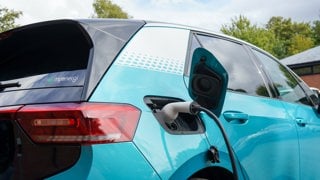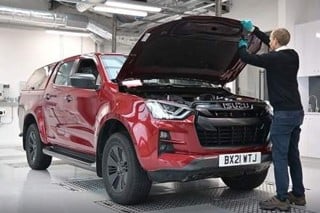As auction houses head into 2025, the challenges of supply management, EV integration, and data security will require innovative solutions.
At this year’s Vehicle Remarketing Association (VRA) Automotive Summit, key industry executives provided a detailed roadmap for navigating the challenges of vehicle remarketing in 2025, leveraging technology and partnerships to stay ahead of the curve.
Stuart Pearson, chief operating officer at BCA, Philip Nothard, insight director at Cox Automotive, and Melissa Seckington, corporate sales development manager at Wilson’s Auctions, headlined the panel discussion, sharing their expert perspectives on market stability, stock management, the integration of electric vehicles (EVs), and technological innovations such as battery health testing.
With supply and EV adoption at the forefront, the panel explored how these issues will shape the future of auctions and the remarketing sector as a whole. Other critical topics included market inflation, the evolving role of data management, and strategies for building buyer confidence.
Navigating Supply Challenges Amid Changing Market Dynamics
A central theme of the discussion was supply management, which experts agree will be a critical challenge in 2025. Stuart Pearson identified supply as a significant focus for remarketing businesses. "Supply will be the thing that is on everybody's minds," Pearson explained.
He highlighted the difficulties of sourcing vehicles across different age brackets. "If your market is three-year-old products, you've got a problem. If it's five-year-old products, it’s getting better. If it's ten-year-old products, it is going to get worse."
The anticipated impact of supply constraints were outlined by Auto Trader’s insight manager Louis Maxwell who told the summit that the pandemic’s impact on new car production will continue to reverberate. “During the 2020–2022 period, we obviously lost 2 million new car sales because of COVID,” Maxwell explained. “Those cars that weren’t produced mean that today we have a lack of three-to-five-year-old cars in the parc.”
Retailers have adapted by turning to older vehicles with retailers of all types now stocking more five-to-ten-year-old cars on forecourts. Even so, this segment is also expected to face a supply crunch with this cohort starting to disappear in the next two years as the effect of the COVID supply shock ripples through.
Despite these challenges, Pearson noted that 2023 marked the most stable year in remarketing in the last five years for BCA, which sets a positive tone heading into 2025.
"Volume is coming back. You need to understand how the market brings volume back," he said, stressing the importance of long-term planning to counteract the volatility in vehicle availability.
Philip Nothard from Cox Automotive reinforced the importance of stock management, especially as market profiles shift. "Stock is the key," he said, noting that Cox Automotive has diversified its focus to include commercial vehicles and plant machinery.
The key, Nothard suggested, is adapting to these evolving profiles and maintaining stability in used vehicle values, which provides confidence to both buyers and sellers.
The Transformative Role of EV Battery Health Checks
One of the summit panel’s discussions revolved around battery health checks for EVs, a growing segment in the remarketing space.
BCA’s Pearson described the introduction of these checks as transformative. "Anecdotally, customers love it. Giving somebody a piece of paper that actually gives you some confidence that an eight-year-old vehicle still has 85% battery health has transformed things," he said.
The vehicle remarketer earlier this year launched a EV battery health grading service for prospective EV buyers where diagnostic specialist Aviloo’s technology is connected to a vehicle's On-Board Diagnostics interface to offer a clear snapshot of the battery health.
Each EV - and BCA plans to sell over 40,000 of them in the next year - is assigned a grade from A to E, along with a precise numbered score based on Aviloo's manufacturer-independent 'Flash Test,' which not only assesses battery health but also detects and identifies potential defects.
Pearson said the initiative has been a game-changer in building buyer confidence, particularly as the market grapples with a short supply of EVs. He also noted its operational benefits: "The last thing any seller wants is the call after the sale about a problem with the battery. Testing is about prevention, not cure."
Melissa Seckington and Philip Nothard both echoed Pearson’s enthusiasm for battery testing. Seckington noted that Wilson’s Auctions is actively exploring partnerships to introduce battery health checks in Ireland and across the UK. "We’re looking to partner already in southern Ireland," she said.
Meanwhile, Cox Automotive has launched a partnership with DHL, focusing on the optimising the lifecycle of EV batteries. "We’re looking at repair, maintenance, renewal, and recycling of batteries," Nothard explained. This holistic approach aims to strengthen confidence in EVs while addressing sustainability concerns.
Seckington also suggested extending battery checks to earlier stages in a vehicle’s lifecycle. "It’s OK having a battery health check at the point of sale, but how do we get it so that it’s at the point of hand-back? We should encourage good care of the battery so that when it comes back, it’s in the right state of health."
Dispelling EV Battery Myths to Build Confidence
Beyond battery health checks, the panel stressed the need to dispel misconceptions about EV batteries. "There’s a perception issue about battery degradation," said Nothard, who explained that most batteries are far more durable than the public assumes. "When they do fail, it’s like an engine failure, not a systemic issue."
Battery certification, they argued, could play a pivotal role in addressing buyer concerns. "Testing from day one through to when that vehicle returns to the remarketing sector is essential," Nothard added.
Both Pearson and Nothard agreed that widespread education and transparency about EV batteries are crucial for sustained market growth.
The Broader Impact of Market Stability and Inflation
While EVs dominated much of the conversation, traditional market dynamics, including inflation and wage pressures, were also highlighted. "We’ve got all the other issues - wage inflation, normal inflation - all of those things are going to challenge every business next year," Pearson noted.
Despite these challenges, the stability of used vehicle values in 2024 provides a foundation for optimism. "The good news is the market is really stable. It’s good for sellers because they’ve got confidence that the price is the price. The buyers don’t see massive depreciation, so they’re confident as well," Pearson observed.
Data Management: A Growing Concern
As vehicles become more data-driven, managing customer information securely is an increasing priority for the remarketing sector. Melissa Seckington explained Wilson’s Auctions’ approach: "We do it as part of the inspection," she said, noting that pushback on this issue has been minimal.
Cox Automotive’s Philip Nothard acknowledged that while processes are in place, data management remains a complex issue. "There are fulfilment requirements by the vendors, the fleet companies, and what they want, but we are obviously conscious it’s an evolving conversation," he said.
He raised the reason why the issue will continue to concern the sector: "Who is responsible for data deletion during the remarketing process? Is it the seller at the point of defleet, or is it the auction or is it the remarketer?"





















Login to comment
Comments
No comments have been made yet.